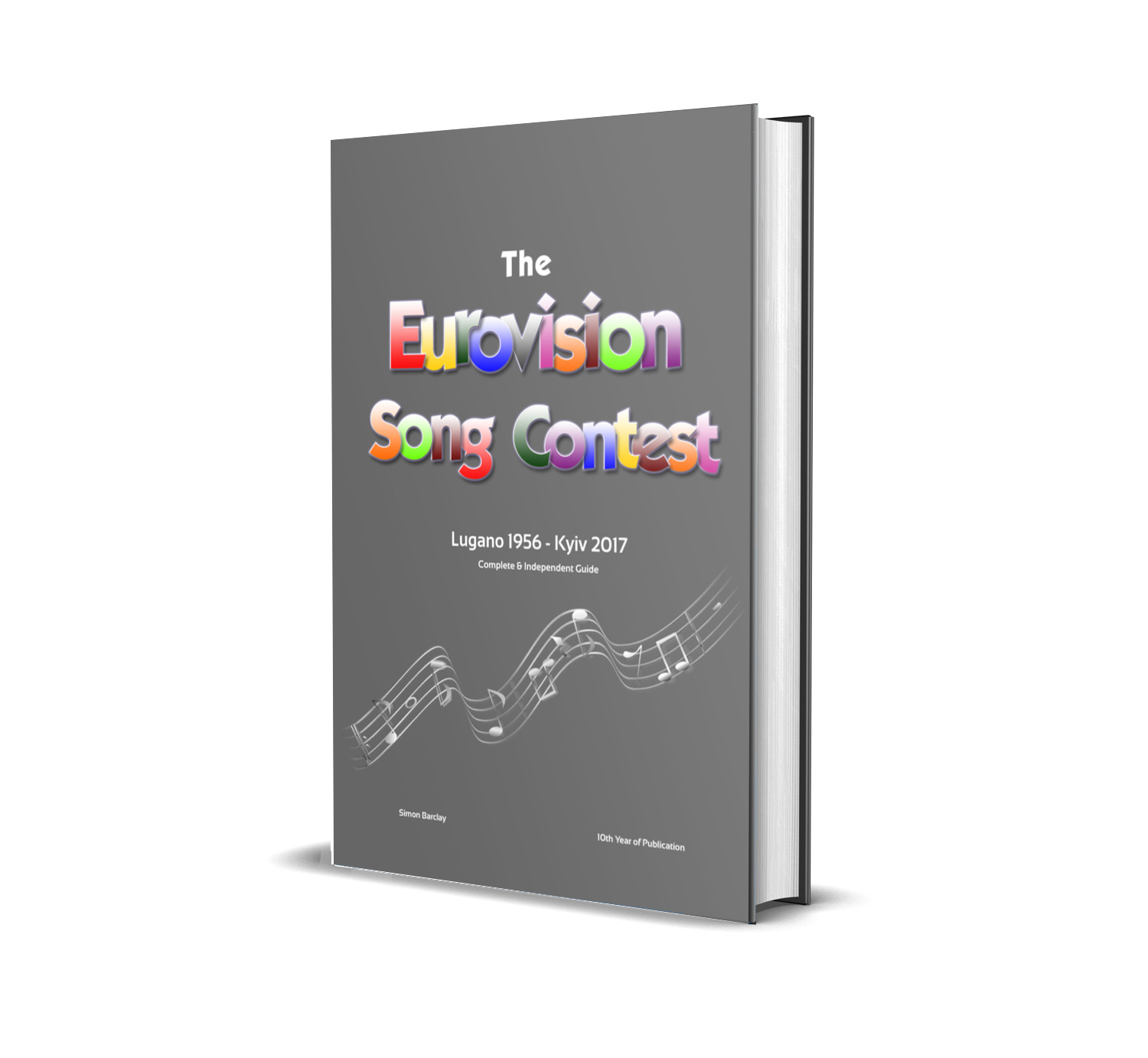Payments can be made securely by Paypal or by credit/debit card. The book will be dispatched in around 10-14 days, but please allow up to 28 days for delivery.
Note for EU customers: we pay the EU IOSS VAT so there will be no further charges when the book arrives.
|
|
|
Introduction to the 2017 Edition
Kyiv hosted Eurovision this year with the organisers staging the 62nd Contest in the city’s 10,000 seater International Exhibition Centre, and watched by an estimated 182 million television viewers. Broadcaster UA:PBC chose Oleksandr Skichko and Volodymyr Ostapchuk to present the shows, while Timur Miroshnychenko entertained us and the performers from the green room. It was the first time Ukraine had hosted the contest since 2005.
Forty-two countries participated, the same number as last year. We welcomed back Portugal and Romania after a one-year break but sadly we lost Bosnia & Herzegovina, for funding reasons and much more controversially Russia, which pulled out a month before the Contest after problems arose over the admittance into Ukraine of their entry Yulia Samoylova, due to her having performed in Crimea after the Russian annexation of the region.
Congratulations to Salvador Sobral and to Portugal who won Eurovision for the first time after 53 years of trying with “Amar pelar dois”. It was Portugal’s first finish even in the top 5, making Salvador’s achievement even more remarkable. Indeed, the top 3 countries in the final all had their best finishes ever. The song gained 18 maximum points from juries in the final and another 12 maximums from the public. Not only did it break the record for the total points under the new scoring system, it would have also smashed the record under the system used between 1975 and 2015.
The “Big 5” continue to achieve poor results, with Spain and Germany finishing with just 11 points between them. Spain were awarded no points at all from any of the juries. Italy were the exception, although they probably consider their 6th place finish a disappointment given their pre-Contest status as massive favourites.
The 2017 Edition of the Complete & Independent Guide is the 10th edition of the book and as usual it’s packed with details of every Contest since 1956 along with plenty of new analysis, in 326 pages. Regular readers will know that we look to include new ways of presenting statistics and this year we have sections on which semi-final is the kiss of death for certain countries, the biggest disagreements between juries and the their public, how some countries receive overwhelmingly more points from juries than the public and vice versa, and each country’s best friends and how they have voted for them over the last ten years.
Contents
Eurovision Winners since 1956
Section One: Qualifying for the 2017 Contest
Section Two: Contest Details & Votes
Contest performers and voting tables: 1950's
Contest performers and voting tables: 1960's
Contest performers and voting tables: 1970's
Contest performers and voting tables: 1980's
Contest performers and voting tables: 1990's
Contest performers and voting tables: 2000's
Contest performers and voting tables : 2010's
2017 First Semi-Final performers, jury voting, televoting and combined results
2017 Second Semi-Final performers, jury voting, televoting and combined results
2017 Final performers, jury voting, televoting and combined results
2017 Final: Voting Order & Spokespersons
Round by Round voting & changes to scoreboard: Jury Voting
Round by Round voting & changes to scoreboard: Public Televoting & combined results
Previous voting sytem: First Semi-Final results
Previous voting sytem: Second Semi-Final results
Previous voting sytem: Final results
Country-by-Country History
Section Three: Statistics & Analysis
Predicting the Winners, the history of votes for the best song
Predicting the Winners, who gives the most 12's and who gives nothing
Pre-Contest Betting Odds
Pre-Contest Official Video Youtube Views
Marcel Bezençon Awards
OGAE poll result
Internal selection or national competition
Winners' Ages & Genders since 1956
2016 Contestants profile - singers & backing performers
9 Year Language history by country
Most Successful Countries League Table
Least Successful Countries League Table
Most Finishes in Top 3
Most Finishes in Bottom 3
Best & worst at qualifying from the semi-finals
Best semi-final to compete in
Most consecutive semi-final failures
Unluckiest semi-finals for each country
Performance of the "Big 5"
Running Order analysis, where is best to perform? Previous voting system
Running Order analysis, where is best to perform? New voting System
Winners & losers position in the order of performance since 1975
Double Douze!
Are You Sure? When Juries and the Public Disagree
Highest number of 12's received by one country
Lowest number of 12's received by a winning country
12 Points Go To… a 10 year history by country
Sharing The Love: the concentration of points awarded
The host country's performance since 1975
Nil Points!
Highest scores in finals
Largest and smallest winning margins
Performance of debutant countries since 1956
Closest voting relationships
Each Country's Best Friends & their 10 year voting history
The most one-sided voting - who doesn't reciprocate?
And countries who have never voted for another
The least friendly pairs of countries: all results since 1975
The least friendly pairs of countries: the effect of the public vote from 2016 onwards
Jury/Public split of points in finals since 2016
Most Points Received since 1975
East v West - the impact of geographical voting
Complete country-by-country voting analysis since 1975 - who votes for who?



No comments:
Post a Comment